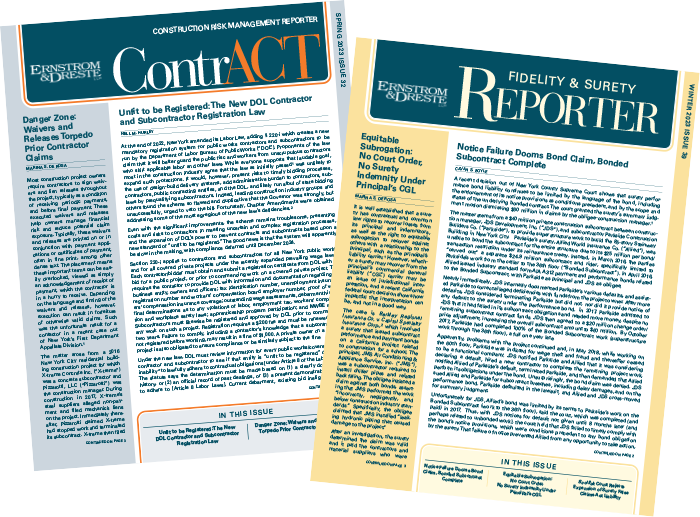Article by: Marina De Rosa
Project Labor Agreements (“PLAs”) are increasingly required on construction projects, which means specific, and perhaps unfamiliar, labor rules and regulations must be followed by contractors. Terms regarding important factors impacting the job also come from other documents, rules, and laws not always directly referenced in the contract documents. One contractor, Lanmark Group Inc. (“Lanmark”), found out the hard way that a PLA-specific labor payment rule, combined with noise restrictions and limited hours of operation imposed by a non-owner entity, meant disaster on a downstate school renovation project.1
Lanmark was awarded an $8 million contract on a public school construction project with the New York City School Construction Authority (“SCA”). Lanmark knew the job was subject to a PLA requiring union wages. It also knew that work was to be performed outside of school hours, starting after 3 p.m. weekdays. Noise restrictions were a part of the project since the work was to be performed in a residential neighborhood. The contract further contained a standard “compliance with laws” provision.
Lanmark learned that the NYC Building Code required permits from the NYC Department of Buildings (“DOB”) to work after 6 p.m. and on weekends, and obtained them. Lanmark also submitted the required noise restriction plan. Even so, multiple noise complaints were received, leading the DOB to restrict Lanmark’s permit hours such that workers were only able to work partial shifts for many weeks. Lanmark also learned that the PLA required payment to workers for 8 full hours each day, even when they actually worked less.
Lanmark complained to SCA that the DOB permit limitations would significantly impact the time necessary to complete the project and cause it to pay tradespeople for hours not worked, among other things. The parties, including DOB, negotiated some measures to address the hours of work and noise issues, but not the payment mandate, and hours remained reduced.
After timely substantial completion of the project, Lanmark submitted a notice of claim to SCA, and thereafter filed suit for over $800,000, for “additional costs incurred due to inefficiency in performing contract work.”2 SCA moved for summary judgment, citing the contract’s “no damage for delay” provision3 and arguing none of the four exceptions to its enforcement applied.4 The lower court granted SCA’s motion and Lanmark appealed.
Lanmark argued primarily that the inefficiencies were uncontemplated by the parties in the contract, and thus not subject to the clause, because “the loss of time created by mandatory reduction in man-hours are not mentioned in the contract.” The appellate court disagreed, finding that, although not explicitly spelled out, the intersection of the contract PLA pay requirement, the restriction of construction to non-school hours, and the need for a discretionary DOB permit for work after 6 p.m. made clear that Lanmark was aware that there was at least the possibility that tradespeople would be able to work as little as 3 hours a day.
The court rejected Lanmark’s argument that SCA breached a fundamental obligation of the contract that project workers be allowed to work 8-hour shifts as a misinterpretation of the PLA terms, which the court noted “required only that they be paid for an 8 hour shift.” Similarly, the court was dismissive of Lanmark’s argument that SCA breached a fundamental obligation by requiring that contractors follow the PLA pay mandate. Although the PLA pay mandate was imposed by SCA, the court said, Lanmark agreed to all PLA terms by entering into the contract. Since none of the exceptions applied, the “no damage for delay” provision barred Lanmark’s delay claim action, held the court, and summary judgment dismissing the action was affirmed.
Contractors should heed the warnings evident in this case. Be sure to carefully review the terms of the applicable PLA and implicated laws, regulations, and codes for project work at the time of bid. As Lanmark learned, for the purpose of a “no damage for delay” clause, “contemplation” under the contract is not limited to obvious contract terms but can extend to conditions for which the contractor is responsible, whether specifically mentioned or not.
- Lanmark Group, Inc. v New York City School Constr. Auth., 214 AD3d 524 [1st Dept 2023].
- Lanmark also asserted the same damages as a claim for extra work, which the court later found “unavailing” without specifically addressing.
- Under New York law, claims that are based on alleged inefficiencies in performing construction work are typically considered delay claims.
- There are four exceptions to such a provision: 1) The delays were caused by the owner’s bad faith and/or willful, malicious, and grossly negligent conduct: 2) The delays were uncontemplated: 3) The delays were so unreasonable they constituted intentional abandonment of the contract by owner; and 4) The delays resulted from owner’s breach of a fundamental obligation of the contract.




